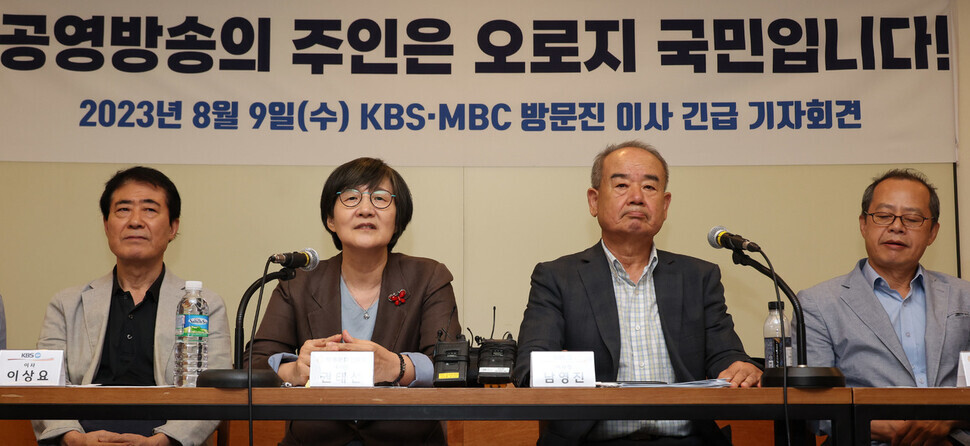hankyoreh
Links to other country sites 다른 나라 사이트 링크
[Editorial] Yoon’s blatant attempts to tighten grip on media

In a plenary meeting on Wednesday, the Korea Communications Commission (KCC) decided to nominate Seo Gi-seok, a former justice on the Constitutional Court, to fill a vacancy on the KBS board of directors. Cha Gi-hwan, an attorney, was appointed to fill an open position on the board of the Foundation of Broadcast Culture (FBC), which holds a majority share in MBC.
KBS directors are appointed by the president on the recommendation of the KCC, while FBC directors are appointed directly by the KCC.
Cha was appointed as a board member at the FBC just two days after Im Jeong-hwan announced that he would be stepping down from the post. That fuels allegations that government-friendly candidates were waiting in the wings to be rubber-stamped by the KCC as soon as the opportunity arose.
Seo replaces Yun Seok-nyeon, a board member who was fired last month after being implicated in manipulating the score of TV Chosun when its broadcasting license was up for renewal.
Since the KCC is also taking steps to dismiss KBS Chairperson Nam Young-jin, the composition of the KBS board will soon switch from 4:7 in favor of the opposition to 6:5 in favor of the ruling party.
Something similar is in the works at the FBC. Following Cha’s appointment, the party alignment on the board will reverse from 3:6 to 5:4 once dismissal proceedings are completed for Chairperson Kwon Tae-sun and board member Kim Gi-jung.
The reshuffle of the boards at KBS and MBC will help the ruling party achieve its goal of gaining control of terrestrial broadcasting in Korea. Seo Gi-seok and Cha Gi-hwan are also projected to chair the boards of KBS and the FBC, respectively.
Cha Gi-hwan played a major role in undermining the independence of public broadcasting during three stints as a director at the FBC and KBS during the presidencies of Lee Myung-bak and Park Geun-hye. Cha hasn’t bothered to disguise his radical ideological tendencies, sharing posts from Ilgan Best Jeojangso (Daily Best Storehouse) — a far-right online message board better known as “Ilbe” — on his social media accounts.
Cha has also courted controversy by making posts that sympathize with wild rumors about North Korean troops being involved in the Gwangju Uprising, in May 1980. While serving as a member of the special committee investigating the tragic sinking of the Sewol ferry, he overtly obstructed the committee’s activities, prompting bereaved family members to file a criminal complaint alleging that he’d overstepped his authority.
Despite the Yoon administration’s grandiose claims about “fairness in public broadcasting,” this is the kind of person to whom the government means to entrust public broadcasting. What exactly does the Yoon administration mean by “fairness”?
It seems clear why the KCC is pushing through these appointments without bothering at all with procedural legitimacy. It’s hoping to complete the management handover before Lee Dong-kwan becomes KCC chair to smooth the way for bringing public broadcasting under the control of the ruling party.
We may be entering a “dark age” for public broadcasting even worse than that we endured during the Lee administration.
Please direct questions or comments to [english@hani.co.kr]

Editorial・opinion
![[Column] Welcome to the president’s pity party [Column] Welcome to the president’s pity party](https://flexible.img.hani.co.kr/flexible/normal/500/300/imgdb/original/2024/0515/3917157400447943.jpg) [Column] Welcome to the president’s pity party
[Column] Welcome to the president’s pity party![[Editorial] Korea must respond firmly to Japan’s attempt to usurp Line [Editorial] Korea must respond firmly to Japan’s attempt to usurp Line](https://flexible.img.hani.co.kr/flexible/normal/500/300/imgdb/original/2024/0514/2317156736305813.jpg) [Editorial] Korea must respond firmly to Japan’s attempt to usurp Line
[Editorial] Korea must respond firmly to Japan’s attempt to usurp Line- [Editorial] Transfers of prosecutors investigating Korea’s first lady send chilling message
- [Column] Will Seoul’s ties with Moscow really recover on their own?
- [Column] Samsung’s ‘lost decade’ and Lee Jae-yong’s mismatched chopsticks
- [Correspondent’s column] The real reason the US is worried about Chinese ‘overcapacity’
- [Editorial] Yoon’s gesture at communication only highlights his reluctance to change
- [Editorial] Perilous stakes of Trump’s rhetoric around US troop pullout from Korea
- [Guest essay] Preventing Korean Peninsula from becoming front line of new cold war
- [Column] The state is back — but is it in business?
Most viewed articles
- 1[Editorial] Korea must respond firmly to Japan’s attempt to usurp Line
- 2[Editorial] Transfers of prosecutors investigating Korea’s first lady send chilling message
- 3[Column] Welcome to the president’s pity party
- 4Second suspect nabbed for gruesome murder of Korean in Thailand, 1 remains at large
- 5Could Korea’s Naver lose control of Line to Japan?
- 6Major personnel shuffle reassigns prosecutors leading investigations into Korea’s first lady
- 7Naver’s union calls for action from government over possible Japanese buyout of Line
- 8Unexpected rate of AI development requires timely discussion of side effects
- 9US has always pulled troops from Korea unilaterally — is Yoon prepared for it to happen again?
- 10China gains 2 new ambassadors to Korea in form of newborn panda cubs